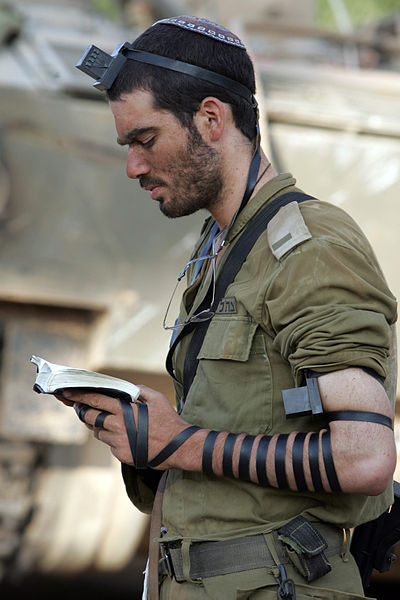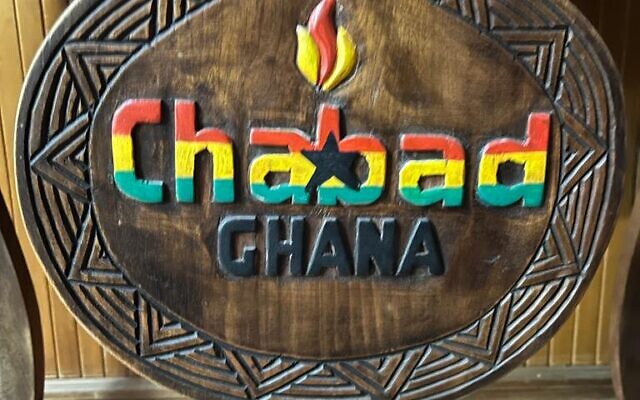OPINION: How Ghana became the setting for a seminal Jewish experience
With the help of Chabad in the African state, acclaimed writer David Patrikarakos laid tefillin for the first time and confounded his expectations about a very Jewish encounter
The Dzorwulu area of downtown Accra, capital of the West African state of Ghana is not the most obvious of places to undergo a seminal Jewish experience. But, it was here, in a large former family home that has been converted into a synagogue, school (and home for a large family) that, as a man in early middle age, I laid tefillin for the very first time.
This unquestionable milestone was achieved through the efforts of Chabad Lubavitch Ghana, and specifically to the splendid Rabbi Noach Majesky and his wife, Alti. Noach is a squat, barrel of a man with a permanent – and cheeky – grin. A man who is warm, perennially welcoming and who has a great love of conversation – and whisky. In short: the very best kind of Jew.
Tefillin are, Google tells me, “a pair of black leather boxes containing Hebrew parchment scrolls,” and the point of this particular ritual is to “to serve as a reminder of God’s intervention at the time of the Exodus from Egypt,” which seems reasonable, I guess.
Each set includes two—one for the head and one for the arm. According to the Torah, Jewish males should bind tefillin to their heads and arms every weekday during morning prayers, except on Sabbath and major Jewish holidays. This, frankly, seems like a lot of hard work to me.
But, I have always been fascinated by it. There’s something about the physicality of it that I have always liked. As a Jew, I’ve always regretted that we lack the iconography of, say, Catholicism. No incense billowing through our houses of worship; no drama of the confessional booth; and, above all, no kneeling in the streetlights to pray before you whack someone.
But Tefillin is different. That leather wound rigorously around the arm – it combines the solemnity of ritual with something more earthy. As a boy, I remember seeing photos of Israeli soldiers during the Six Day War laying Tefillin before they went into battle. That particular combination of the sacred and the martial stuck with me; it just seemed so irretrievably…Jewish.

I arrived at the house one Saturday morning in March of this year, with my friend the writer, traveller and éminence grise, Annika Hernroth-Rothstein, who had, essentially, bullied me into coming. “Ugh, it’s gonna be boring,” I remember mumbling, like an adolescent. But Annika, who is always keen to see any sort of general improvement in me, especially in matters of Judaism, was insistent. “No,” she said. “It won’t be.”
She was, of course, totally right. From the moment I stepped through the large entrance and into a large room with a rectangle of tables I felt at home. Even the service was wonderful and as I stepped up to the altar with Noach and as he bound the tefillin around me and we muttered the prayers (me simply repeating after him) – davening back and forth together – I felt that I was in touch with something; and if it wasn’t God exactly it was something far more proximate – and thereby powerful – for me: other Jews.
After the service we sat down to lunch, prepared by the skilful and sophisticated Alti and I discussed everything from Putin’s invasion of Ukraine with the large and stolid Belarusian Gennady, to the best places to go out in New York with some other visiting Jews from diaspora and ate and drank I understood why Noah and Alti do what they do.
This, to me, in the end is what Judaism is: a religion that brings you together with other Jews, both those around you and, perhaps even more importantly, the long lines of our forebears that reach back into history. By laying tefillin I felt I was imprinting this history on to me physically and, as a result I will never forget it.

Thank you for helping to make Jewish News the leading source of news and opinion for the UK Jewish community. Today we're asking for your invaluable help to continue putting our community first in everything we do.
For as little as £5 a month you can help sustain the vital work we do in celebrating and standing up for Jewish life in Britain.
Jewish News holds our community together and keeps us connected. Like a synagogue, it’s where people turn to feel part of something bigger. It also proudly shows the rest of Britain the vibrancy and rich culture of modern Jewish life.
You can make a quick and easy one-off or monthly contribution of £5, £10, £20 or any other sum you’re comfortable with.
100% of your donation will help us continue celebrating our community, in all its dynamic diversity...
Engaging
Being a community platform means so much more than producing a newspaper and website. One of our proudest roles is media partnering with our invaluable charities to amplify the outstanding work they do to help us all.
Celebrating
There’s no shortage of oys in the world but Jewish News takes every opportunity to celebrate the joys too, through projects like Night of Heroes, 40 Under 40 and other compelling countdowns that make the community kvell with pride.
Pioneering
In the first collaboration between media outlets from different faiths, Jewish News worked with British Muslim TV and Church Times to produce a list of young activists leading the way on interfaith understanding.
Campaigning
Royal Mail issued a stamp honouring Holocaust hero Sir Nicholas Winton after a Jewish News campaign attracted more than 100,000 backers. Jewish Newsalso produces special editions of the paper highlighting pressing issues including mental health and Holocaust remembrance.
Easy access
In an age when news is readily accessible, Jewish News provides high-quality content free online and offline, removing any financial barriers to connecting people.
Voice of our community to wider society
The Jewish News team regularly appears on TV, radio and on the pages of the national press to comment on stories about the Jewish community. Easy access to the paper on the streets of London also means Jewish News provides an invaluable window into the community for the country at large.
We hope you agree all this is worth preserving.






















